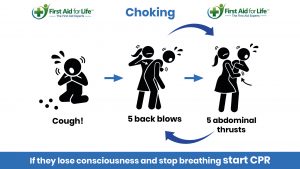
Emma Hammett, founder of First Aid for Life and qualified nurse, explains how education is essential for preventing choking-related accidents.
Choking is primarily caused by food or an object blocking the airway. ONS statistics reported that, on average, 351 people die each year due to choking.1 Everyone is at risk of choking incidents, however, there are certain demographics who are more vulnerable to this hazard.
According to statistics, an average of one child every month dies from choking in the UK.2 Young children are vulnerable to choking as they have very small airways which can be obstructed with greater ease. Although the ability to chew and swallow is second nature as you get older, this essential function is something young children must learn to do. A 2019 report revealed that children may not be able to master this skill, sometimes up until the age of six.3
For babies, their ability to cough may not be strong enough for them to be able to dislodge the food or object that has blocked their airway, causing them to choke. Babies rely on their mouths for further sensory input and therefore, will commonly put objects into their mouths, again leaving them vulnerable to choking.
Adults over the age of 65 are also particularly vulnerable to choking. From 2018 to 2019, 214 people died in hospital due to choking, with 180 people being 65 and over.4 Choking is common within the over 65 age group due to factors such as having fewer teeth or having dentures that are ill-fitting, having dysphagia which means that the patient has difficulty swallowing, or eating too fast.
Knowing how to help someone who is choking is vital, as many choking-related deaths or incidents could easily be prevented. Through her company First Aid for Life, founder Emma Hammett raises awareness about the importance of accident prevention. Here, she tells Health Europa about the causes of choking and explains how choking-related accidents can be prevented through a greater understanding of the associated risks.
What are the key aims of First Aid for Life?
As an organisation, our key goal is to empower and equip as many people as possible with the skills and confidence to competently help in a medical emergency.
Are there any particular demographics who are most at risk of choking emergencies?
Anyone can choke – particularly if laughing, talking, or running whilst eating. However, babies and young children are most likely to choke as they tend to put more things in their mouths and are less used to coughing and gagging to remove it if something goes down the wrong way. Older people are also extremely vulnerable to choking and may struggle with swallowing and have a less effective gag reflex. Teenagers often play games, throwing sweets up and catching them in their mouths or putting batteries or magnets on their tongues, both of which are extremely dangerous pursuits.

Some people can also develop problems with swallowing, and this can make it more likely that they may choke. Sadly, embarrassment can lead to fatalities as people in restaurants are embarrassed to be choking in public and may remove themselves to the toilet. It is also harder to help yourself when choking on your own, although there are ways of manoeuvring yourself over a chair back that can help.
What are some of the most common choking hazards?
Food, small toys, sweets, and anything that can fit through a toilet roll tube that someone may put in their mouths.
What actions can people take in their day-to-day lives to minimise the risk of choking?
Babies or small children should never be left unattended at mealtimes. Keep small items out of reach of very young children and ensure they cannot access the contents of handbags etc. Always encourage people to sit down and eat and try not to talk whilst chewing food. Also, playing games with food should be avoided.
Is education a significant factor in preventing accidents? Is more action needed to raise awareness of the public health risks arising from accidental injuries?
Accident prevention and awareness of risks associated with certain actions is vital. Many people do not understand the dangers of things like button batteries, magnets and liquitabs. Education is critical to encourage parents to put these sorts of things out of reach of those that could injure themselves. Training in first aid is vital to ensure people have the skills to help should an accident happen and lead to a medical emergency.
First Aid for Life have a free online first aid course to learn how to help someone if they choke: onlinefirstaid.com/courses/choking/
References
- cesafety.co.uk/choking-deaths-report-2019/
- www.rospa.com/resource s/hubs/keeping-kids-safe/choking
- cesafety.co.uk/choking-deaths-report-2019/
- cesafety.co.uk/choking-deaths-report-2019/
Emma Hammett
First Aid for Life
Founder
firstaidforlife.org.uk
This article is from issue 19 of Health Europa Quarterly. Click here to get your free subscription today.
























